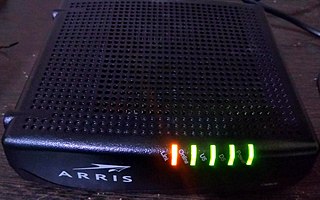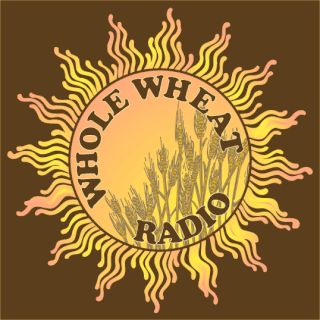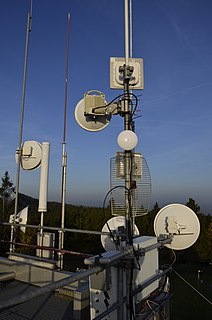
The Internet is the global system of interconnected computer networks that uses the Internet protocol suite (TCP/IP) to communicate between networks and devices. It is a network of networks that consists of private, public, academic, business, and government networks of local to global scope, linked by a broad array of electronic, wireless, and optical networking technologies. The Internet carries a vast range of information resources and services, such as the inter-linked hypertext documents and applications of the World Wide Web (WWW), electronic mail, telephony, and file sharing.
A network switch is networking hardware that connects devices on a computer network by using packet switching to receive and forward data to the destination device.

A cable modem is a type of network bridge that provides bi-directional data communication via radio frequency channels on a hybrid fibre-coaxial (HFC), radio frequency over glass (RFoG) and coaxial cable infrastructure. Cable modems are primarily used to deliver broadband Internet access in the form of cable Internet, taking advantage of the high bandwidth of a HFC and RFoG network. They are commonly deployed in the Americas, Asia, Australia, and Europe.
Voice over Internet Protocol (VoIP), also called IP telephony, is a method and group of technologies for the delivery of voice communications and multimedia sessions over Internet Protocol (IP) networks, such as the Internet. The terms Internet telephony, broadband telephony, and broadband phone service specifically refer to the provisioning of communications services over the Internet, rather than via the public switched telephone network (PSTN), also known as plain old telephone service (POTS).
The Simple Service Discovery Protocol (SSDP) is a network protocol based on the Internet protocol suite for advertisement and discovery of network services and presence information. It accomplishes this without assistance of server-based configuration mechanisms, such as Dynamic Host Configuration Protocol (DHCP) or Domain Name System (DNS), and without special static configuration of a network host. SSDP is the basis of the discovery protocol of Universal Plug and Play (UPnP) and is intended for use in residential or small office environments. It was formally described in an Internet Engineering Task Force (IETF) Internet Draft by Microsoft and Hewlett-Packard in 1999. Although the IETF proposal has since expired, SSDP was incorporated into the UPnP protocol stack, and a description of the final implementation is included in UPnP standards documents.
Cisco Internetwork Operating System (IOS) is a family of network operating systems used on many Cisco Systems routers and current Cisco network switches. Earlier, Cisco switches ran CatOS. IOS is a package of routing, switching, internetworking and telecommunications functions integrated into a multitasking operating system. Although the IOS code base includes a cooperative multitasking kernel, most IOS features have been ported to other kernels such as QNX and Linux for use in Cisco products.

Whole Wheat Radio was a not-for-profit, listener-driven online community radio station from Talkeetna, Alaska. It was centered around independent music, and aired 24 hours a day.

Tokai Communications Corporation Inc is a telecommunications company in Japan providing DSL services and network solutions. Its headquarters are in the Tokai Building in Aoi-ku, Shizuoka, Shizuoka Prefecture. In North America, it is best known for its video games during the late 1980s and throughout the 1990s. In the US, they published games for the Nintendo Entertainment System, the Game Boy, the Super Nintendo Entertainment System, the Nintendo 64, the Sega Genesis, the Sega CD, the Sega Saturn, and the PlayStation.

The Perodua Kenari is a city car produced by Malaysian automotive company Perodua. The Kenari is based on the second generation Daihatsu Move kei car (minicar) with a 990 cc DOHC engine powering it. The name Kenari is a Malaysian name equivalent to the word canary, which translates to joy and freedom.

BrickFest was the first convention for adult fans of Lego (AFOLs) in the United States. The focus was to have fans bring their creations, often referred to as MOCs, to display and share with fellow enthusiasts.
IP multicast is a method of sending Internet Protocol (IP) datagrams to a group of interested receivers in a single transmission. It is the IP-specific form of multicast and is used for streaming media and other network applications. It uses specially reserved multicast address blocks in IPv4 and IPv6.

In September 2005, units of the Mexican Armed Forces responded to the emergency situations after Hurricane Katrina with aid and assistance, appearing as a flagged, uniformed force in the United States for the first time since World War II in the 1940s and the first operational deployment of Mexican troops to the U.S. in 159 years.

The AMPRNet or Network 44 is used in amateur radio for packet radio and digital communications between computer networks managed by amateur radio operators. Like other amateur radio frequency allocations, an IP range of 44.0.0.0/8 was provided in 1981 for Amateur Radio Digital Communications and self-administered by radio amateurs. In 2001, undocumented and dual-use of 44.0.0.0/8 as an internet telescope began, recording the spread of the Code Red II worm in July 2001. In mid-2019, part of IPv4 range was sold off for conventional use, due to IPv4 address exhaustion.

A computer network is a set of computers sharing resources located on or provided by network nodes. The computers use common communication protocols over digital interconnections to communicate with each other. These interconnections are made up of telecommunication network technologies, based on physically wired, optical, and wireless radio-frequency methods that may be arranged in a variety of network topologies.

Narus Inc. was a software company and vendor of big data analytics for cybersecurity.
Network Access Control (NAC) is an approach to computer security that attempts to unify endpoint security technology, user or system authentication and network security enforcement.
Vyatta is a software-based virtual router, virtual firewall and VPN products for Internet Protocol networks. A free download of Vyatta has been available since March 2006. The system is a specialized Debian-based Linux distribution with networking applications such as Quagga, OpenVPN, and many others. A standardized management console, similar to Juniper JUNOS or Cisco IOS, in addition to a web-based GUI and traditional Linux system commands, provides configuration of the system and applications. In recent versions of Vyatta, web-based management interface is supplied only in the subscription edition. However, all functionality is available through KVM, serial console or SSH/telnet protocols. The software runs on standard x86-64 servers.
GoFish was a San Francisco-based online video sharing website founded in 2003 by Michael Downing. It was founded as a search engine for digital music, audio books, ringtones and other media online, and operated as GoFish until 2009 then the service became the advertising network BetaWave in 2009 after a failed attempt at changing their niche into children's media. In 2010, BetaWave had also shutdown after "running out of money".









